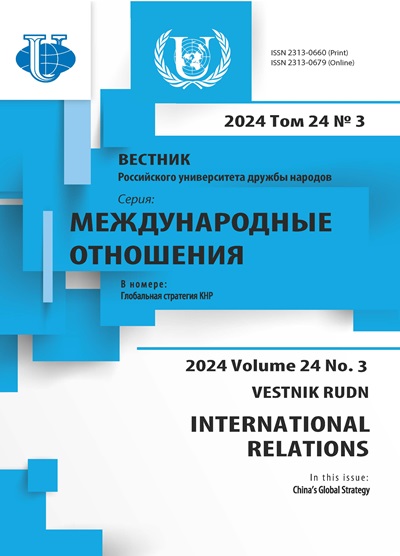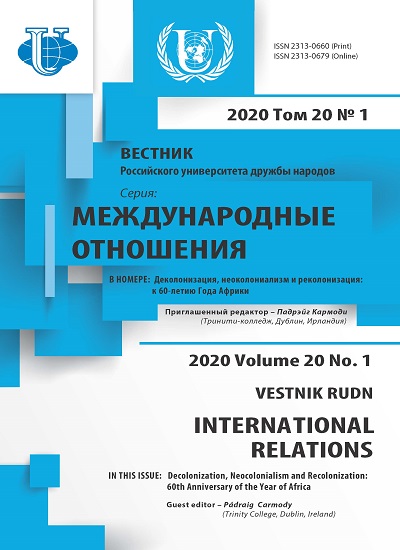Международные отношения в Африке, истории геноцида и эмансипации. Часть 1
- Авторы: Кэмпбелл Х.G.1
-
Учреждения:
- Сиракузский университет
- Выпуск: Том 20, № 1 (2020): Деколонизация, неоколониализм и реколонизация: к 60-летию Года Африки
- Страницы: 115-130
- Раздел: ТЕМАТИЧЕСКОЕ ДОСЬЕ
- URL: https://journals.rudn.ru/international-relations/article/view/23326
- DOI: https://doi.org/10.22363/2313-0660-2020-20-1-115-130
Цитировать
Полный текст
Аннотация
Умолчание проблемы геноцида в международных отношениях - это одна из форм отрицания геноцида, которая в будущем может привести к новым масштабным преступлениям. В статье утверждается, что в эпоху глобального милитаризированного апартеида перед прогрессивными учеными стоит задача критиковать и разоблачать прошлые и нынешние преступления против человечности, которые происходят в Африке. Опираясь на альтернативный анализ в рамках Бандунгского проекта, в статье был проанализирован вклад идей, возникших в результате борьбы против апартеида и за репаративное правосудие. Борьба Глобального Юга достигла кульминации в ходе Всемирной конференции против расизма (WCAR), в результате чего антирасистская проблематика стала центральной в международных отношениях в Африке. Новая энергия, появившаяся в результате затяжной борьбы за хлеб, мир и справедливость, приняла форму перехода к Африканскому союзу, оставив позади концепцию невмешательства во внутренние дела государств. В статье анализируется усиление афропессимизма в контексте конструктивистских подходов в африканских международных отношениях. Вклад радикальных африканских феминисток представлен как новое направление, в котором происходит слияние прогрессивных антиимпериалистических интеллектуальных традиций с радикальными формами феминизма. Эти две традиции открывают возможности для эмансипативного проекта. Этот проект приобрел особое значение в период хрупкости глобального капитала, когда неустойчивость капитализма угрожает новыми и бесконечными войнами и дестабилизацией в Африке. Современный гуманизм является оружием против этого, и именно в этом направлении ученые должны вести дискуссию о «несостоявшихся государствах» в Африке.
Об авторах
Хорас Кэмпбелл
Сиракузский университет
Автор, ответственный за переписку.
Email: hgcampbe@syr.edu
доктор философии, профессор политологии и афро-американских исследований, Школа гражданства и публичной политики им. Дж. Максвелла
Сиракьюс, СШАСписок литературы
- Adebajo, A., Adedeji, A. & Landsberg, C. (2007). South Africa in Africa: The Post-Apartheid Era. Scottsville: University of KwaZulu-Natal Press.
- Agwu, F.A. (2009). National Interest, International Law and Our Shared Destiny. Ibadan: Spectrum Books.
- Agwu, F.A. (2019). Africa and International Criminal Justice: Radical Evils and the International Criminal Court. London: Taylor and Francis. doi: 10.4324/9780429342738
- Amadiume, I. & An-Na’im, A.A. (2000). The Politics of Memory: Truth, Healing and Social Justice. London: Zed Books.
- Amin, S. (2004). The Liberal Virus: Permanent War and the Americanization of the World. New York: Monthly Review Press.
- Amin, S. (2006). A Life Looking Forward: Memoirs of an Independent Marxist. London: Zed Books.
- Amin, S. (2013). The Implosion of Contemporary Capitalism. New York: Monthly Review Press.
- Amin, S. (2014). Capitalism in the Age of Globalization. London: Zed Press.
- Barnett, M. (2002). Eyewitness to a Genocide: The United Nations and Rwanda. New York: Cornell University.
- Bauman, Z. (1989). Modernity and the Holocaust. New York: Cornell University Press.
- Bernal, M. (1987). Black Athena: Afroasiatic Roots of Classical Civilization. Vol. I: The Fabrication of Ancient Greece, 1785-1985. New Brunswick: Rutgers University Press.
- Besteman, C. (2018). Militarized Global Apartheid. Current Anthropology, 60 (19), 26-38. doi: 10.1086/699280
- Bond, P. (2004). Talk Left, Walk Right: South Africa’s Frustrated Global Reforms. Scottsville: University of KwaZulu-Natal Press.
- Brooks, R. (2016). How Everything Became War and the Military Became Everything. New York: Simon & Schuster.
- Brown, W. (2006). Africa and International Relations: A Comment on IR Theory, Anarchy and Statehood. Review of International Studies, 32 (01), 119-143. doi: 10.1017/S0260210506006954
- Campbell, H. (2018). Nelson Mandela and the Universalist Spirit. In: Shubin, V.G. & Zelenova, D.A. (Eds). South Africa: Pages of History and Contemporary Politics. Moscow: Institute for African Studies, Russian Academy of Sciences
- Campbell, H.G. (2013). Global NATO and the Catastrophic Failure in Libya: Lessons for Africa in the Forging of African Unity. New York: Monthly Review Press.
- Clarke, K.M. (2019). Affective Justice: The International Criminal Court and the Pan-Africanist Pushback. Durham: Duke University Press.
- Cook-Lynn, E. (2011). A Separate Country: Postcoloniality and American Indian Nations. Lubbock: Texas Tech University Press.
- Crenshaw, K. (1989). Demarginalizing the Intersection of Race and Sex: A Black Feminist Critique of Antidiscrimination Doctrine, Feminist Theory and Antiracist Politics. University of Chicago Legal Forum, 1, 139-167. URL: https://chicagounbound.uchicago.edu/cgi/viewcontent.cgi?referer=&httpsredir=1&article= 1052&context=uclf (accessed: 10.01.2020)
- Crocker, C. (1992). High Noon in Southern Africa: Making Peace in a Rough Neighborhood. New York: Norton.
- Daley, P. (2008). Gender and Genocide in Burundi: The Search for Spaces of Peace in the Great Lakes Region. London: James Currey.
- Dallaire, R. (2004). Shake Hands with the Devil. The Failure of Humanity. New York: Carroll and Graf Publishers.
- De Witte, L. (2001). The Assassination of Lumumba. New York: Verso Books.
- Diop, B.B. (2014). Murambi, le livre des ossements. Paris: Zulma Editions.
- Diop, C.A. (1991). Civilization or Barbarism: An Authentic Anthropology. New York: Lawrence Hill.
- Du Bois, W.E.B. (1915). The African Roots of War. Atlantic, May, 707-714. URL: http://scua.library.umass.edu/digital/dubois/WarRoots.pdf (accessed: 10.01.2020).
- Du Bois, W.E.B. (1947). The World and Africa: An Inquiry into the Part Which Africa Has Played in World History. New York: Viking Press.
- Dunn, K.C. & Shaw T.M. (Eds). (2001). Africa’s Challenge to International Relations Theory. New York: Palgrave.
- Eglash, R. (1999). African Fractals: Modern Computing and Indigenous Design. New Brunswick: Rutgers University Press.
- Fanon, F. (1961). The Wretched of the Earth. New York: Grove Press.
- Fanon, F. (2008). Black Skin, White Masks. New York: Grove Press.
- Gellately, R. & Kiernan, B. (2003). The Specter of Genocide: Mass Murder in Historical Perspective. Cambridge: Cambridge University Press. doi: 10.1017/CBO9780511819674
- Gleijeses, P. (2013). Visions of Freedom: Havana, Washington, Pretoria, and the Struggle for Southern Africa, 1976-1991. Chapel Hill: University of North Carolina Press.
- Gourevitch, P. (1999). We Wish to Inform You That Tomorrow We Will Be Killed with Our Families: Stories from Rwanda. New York: Picador Books.
- Hearn, J. (2000). Aiding Democracy? Donors and Civil Society in South Africa. Third World Quarterly, 21 (05), 815-830. doi: 10.1080/713701079
- Henderson, E.A. (2013). Hidden in Plain Sight: Racism in International Relations Theory. Cambridge Review of International Affairs, 26 (01), 71-92. doi: 10.1080/09557571.2012.710585
- Hobsbawm, E.J. (1996). The Age of Extremes: A Short History of the World. New York: Vintage Books.
- Hochschild, A. (1998). King Leopold’s Ghost: A Story of Greed, Terror and Heroism in Colonial Africa. New York: Mariner Books.
- Horne, G. (2013). Black Revolutionary: William Patterson and the Globalization of the African American Freedom Struggle. Champaign: University of Illinois Press.
- Hudson, P.J. (2017). Racial Capitalism and the Dark Proletariat. Boston Review, Winter. URL: http://bostonreview.net/forum/remake-world-slavery-racial-capitalism-and-justice/peter-james-hudson-racial-capitalism-and (accessed: 10.01.2020)
- James, C.L.R. (1989). The Black Jacobins: Toussaint L’Ouverture and the San Domingo Revolution. New York: Vintage Books.
- Jones, A. (2002). Gender and Genocide in Rwanda. Journal of Genocide Research, 4 (01), 65-94. doi: 10.1080/14623520120113900
- Jones, G.B. (Eds.). (2006). Decolonizing International Relations. Lanham: Rowman and Littlefield.
- Klotz, A. (1995). Norms Reconstituting Interests: Global Racial Equality and U.S. Sanctions against South Africa. International Organization, 49 (03), 451-478. doi: 10.1017/S0020818300033348
- Kuperman, A.J. (2013). A Model Humanitarian Intervention? Reassessing NATO’s Libya Campaign. International Security, 38 (01), 105-136. doi: 10.1162/ISEC_a_00126
- Kuperman, A.J. (2019). America’s Little-Known Mission to Support Al Qaeda’s Role in Libya. National Interest, August 13. URL: https://nationalinterest.org/feature/americas-little-known-mission-support-al-qaedas-role-libya-73271 (accessed: 10.01.2020)
- Lake, A. (1976). The “Tar Baby” Option: American Policy toward Southern Rhodesia. New York: Columbia University Press.
- Lintock, A. (1995). Imperial Leather: Race Gender and Sexuality in the Colonial Context. London: Routledge.
- Lynch, H.R. (1978). Black American Radicals and the Liberation of Africa: The Council on African Affairs, 1937-1955. New York: Cornell University.
- Mafeje, A. (1992). In Search of an Alternative: A Collection of Essays on Revolutionary Theory and Politics. Harare: SAPES Books.
- Magubane, B.M. (1979). The Political Economy of Race and Class in South Africa. New York: Monthly Review Press.
- Mamdani, M. (1996). Citizen and Subject: Contemporary Africa and the Legacy of Late Colonialism. Princeton: Princeton University Press.
- Mamdani, M. (2002). When Victims Become Killers: Colonialism, Nativism, and the Genocide in Rwanda. Princeton: Princeton University Press.
- Mamdani, M. (2010). Saviors and Survivors: Darfur, Politics, and the War on Terror. New York: Doubleday.
- Marx, K. (1867/1967). Capital. New York: International Publishers.
- Mayer, A. (2016). Naija Marxisms: Revolutionary Thought in Nigeria. London: Pluto Press.
- Mazrui, A. (1977). Africa’s International Relations: The Diplomacy of Dependency and Change. Boulder: Westview Press.
- Mkandawire, T. & Olukushi, A. (Eds.) (1995). Between Liberalisation and Oppression: The Politics of Structural Adjustment in Africa. Dakar: CODESRIA.
- Neocosmos, M. (2016). Thinking Freedom in Africa: Toward a Theory of Emancipatory Politics. Johannesburg: Wits University Press.
- Nkiwane, T. (2001). Africa and International Relations: Regional Lessons for a Global Discourse. International Political Science Review, 22 (03), 279-290. doi: 10.1177/0192512101223005
- Nkrumah, K. (2007). Africa Must Unite. London: Panaf Books.
- Nzula, A.T. (1979). Forced Labour in Colonial Africa. Chicago: Lawrence Hill Books.
- Padmore, G. (1969). How Britain Rules Africa. New York: Negro Universities Press.
- Patterson, W.L. (1952). We Charge Genocide: The Historic Petition to the United Nations for Relief from a Crime of the United States Government Against the Negro People. Detroit: Civil Rights Congress.
- Prashad, V. (2014). The Poorer Nations: A Possible History of the Global South. New York: Verso Books.
- Pye, L. (1971). Warlord Politics: Conflict and Coalition in the Modernization of Republican China. New York: Praeger.
- Rasmus, J. (2015). Systemic Fragility in the Global Economy. Atlanta: Clarity Press.
- Robinson, C. (1983), Black Marxism: The Making of the Black Radical Tradition. Chapel Hill: University of North Carolina Press.
- Rodney, W. (1970). The Imperialist Partitioning of Africa. Monthly Review, 21 (11), 103-114.
- Schorr, V. (2011). Economics of Afro-Pessimism: The Economics of Perception in African Foreign Direct Investment. Nokoko, 2, 23-62.
- Shaw, M. (2003). War and Genocide: Organized Killing in Modern Society. Oxford: Polity Press.
- Shepherd, G.W. (1998). The Study of Race in American Foreign Policy and International Relations. In: Krenn, M. (Eds.). Race and U.S. Foreign Policy from Colonial Times through the Age of Jackson. New York: Garland Publishers
- Smith, K. (2009). Has Africa Got Anything to Say? African Contributions to the Theoretical Development of International Relations. The Round Table, 98 (402), 269-284. doi: 10.1080/00358530902895378
- Smith, S., Booth, K. & Zalewski, M. (Eds). (1996). International Theory: Positivism and Beyond. Cambridge: Cambridge University Press.
- Stannard, D. (1992). The American Holocaust: Columbus and the Conquest of the New World. Oxford: Oxford University Press.
- Starr, S. (2007). Extraordinary Crimes at Ordinary Times International Justice beyond Crisis Situations. Northwestern University Law Review, 101 (03), 1257-1314.
- Steans, J. (2013). Gender and International Relations. Oxford: Polity Books.
- Tandon, Y. (1972). The Organization of African Unity: A Forum for African International Relations. The Round Table, 62 (246), 221-230. doi: 10.1080/00358537208453021
- Tandon, Y. (1982). University of Dar es Salaam: Debate on Class, State and Imperialism. Dar es Salaam: Tanzania Publishing House.
- Tandon, Y. (1984). Arguments within African Marxism: the Dar es Salaam Debates. Journal of African Marxists, 5, 31-43.
- Whitaker, B.E. & Clark, J.F. (2018). Africa’s International Relations, Balancing Domestic and Global Interests. Boulder: Lynne Rienner.
- Xuetong, Y. (2011). Ancient Chinese Thought, Modern Chinese Power. Princeton: Princeton University Press.
- Zim, H. (1980). A People’s History of the United States. New York: Harper & Row.











